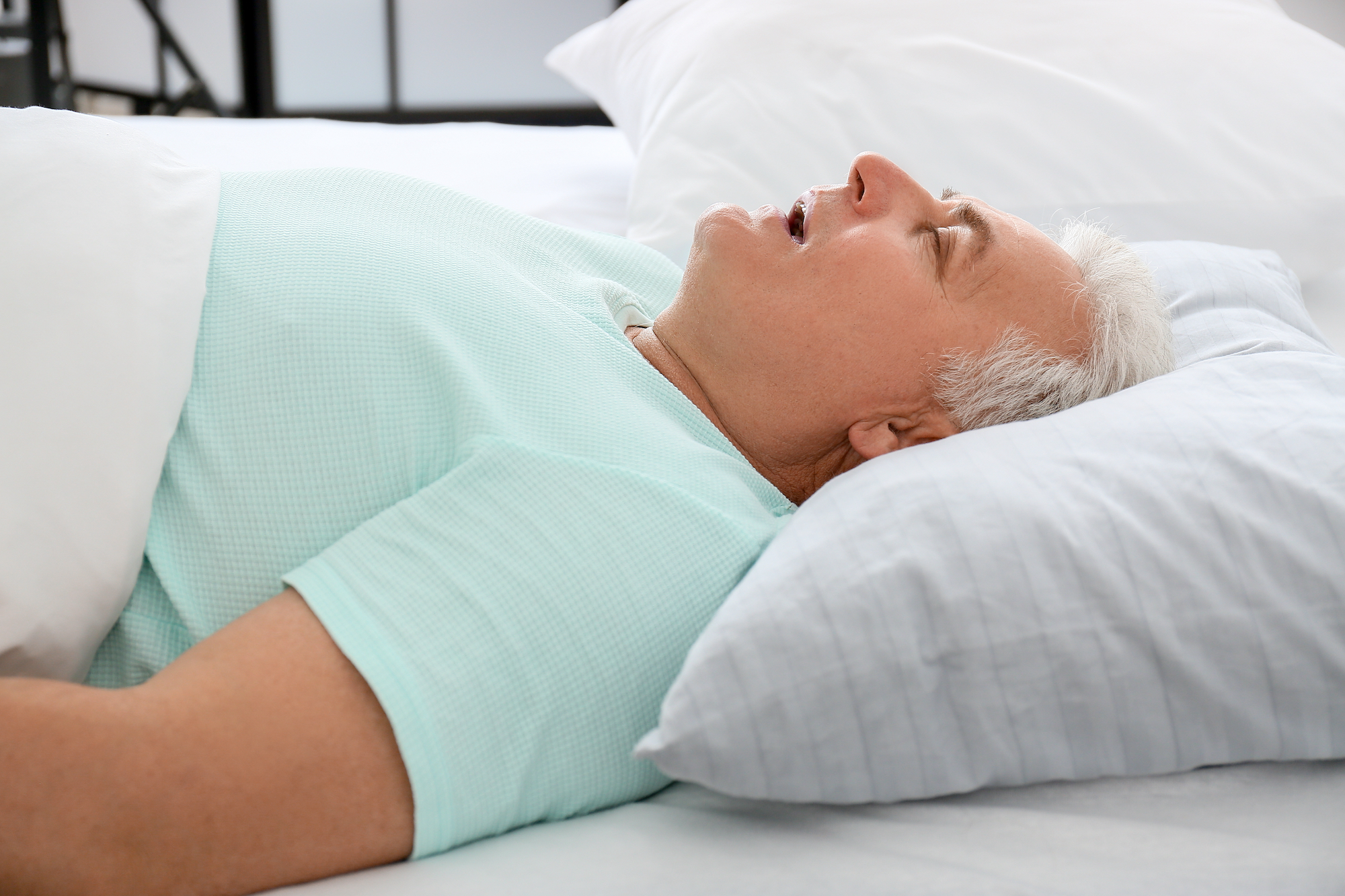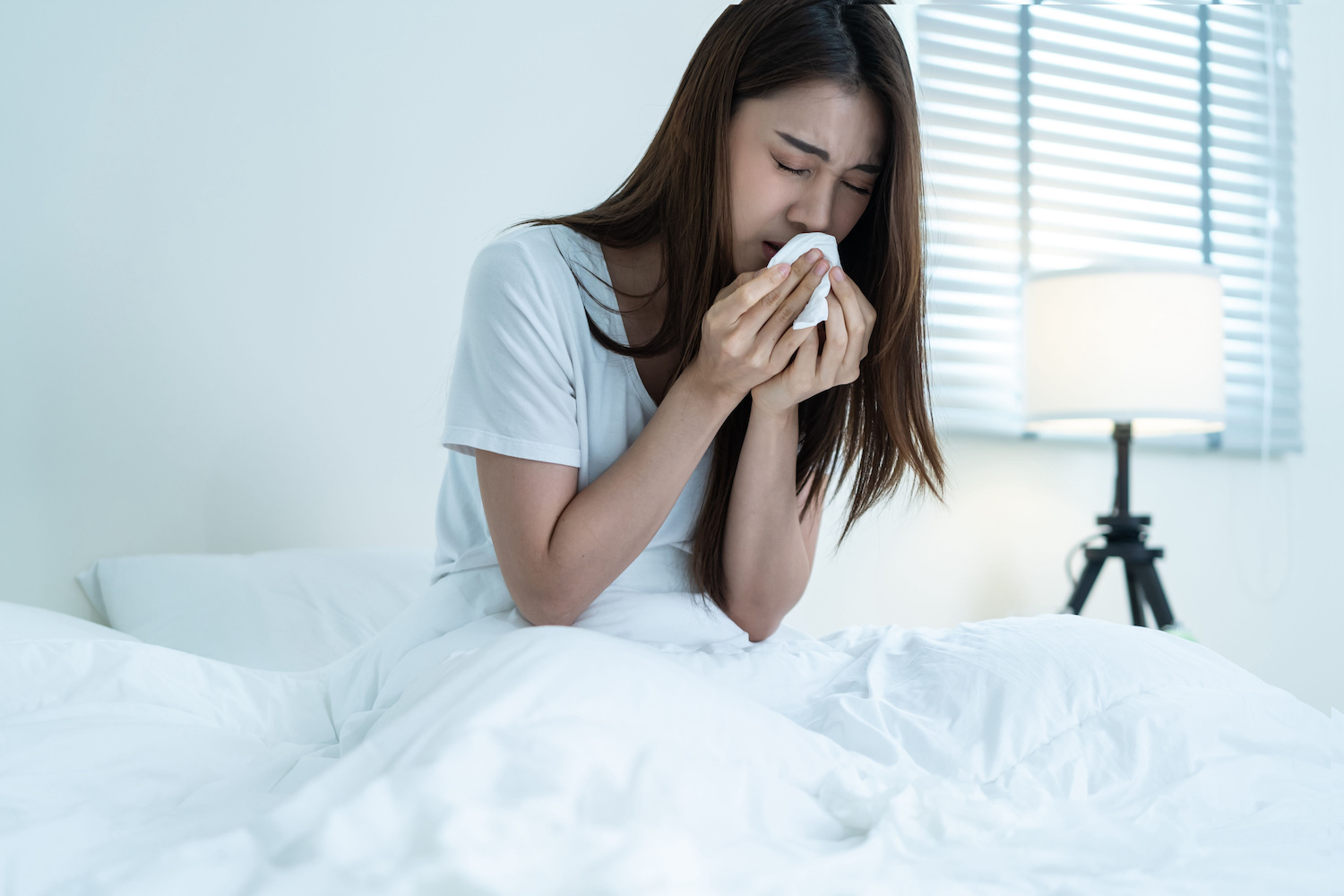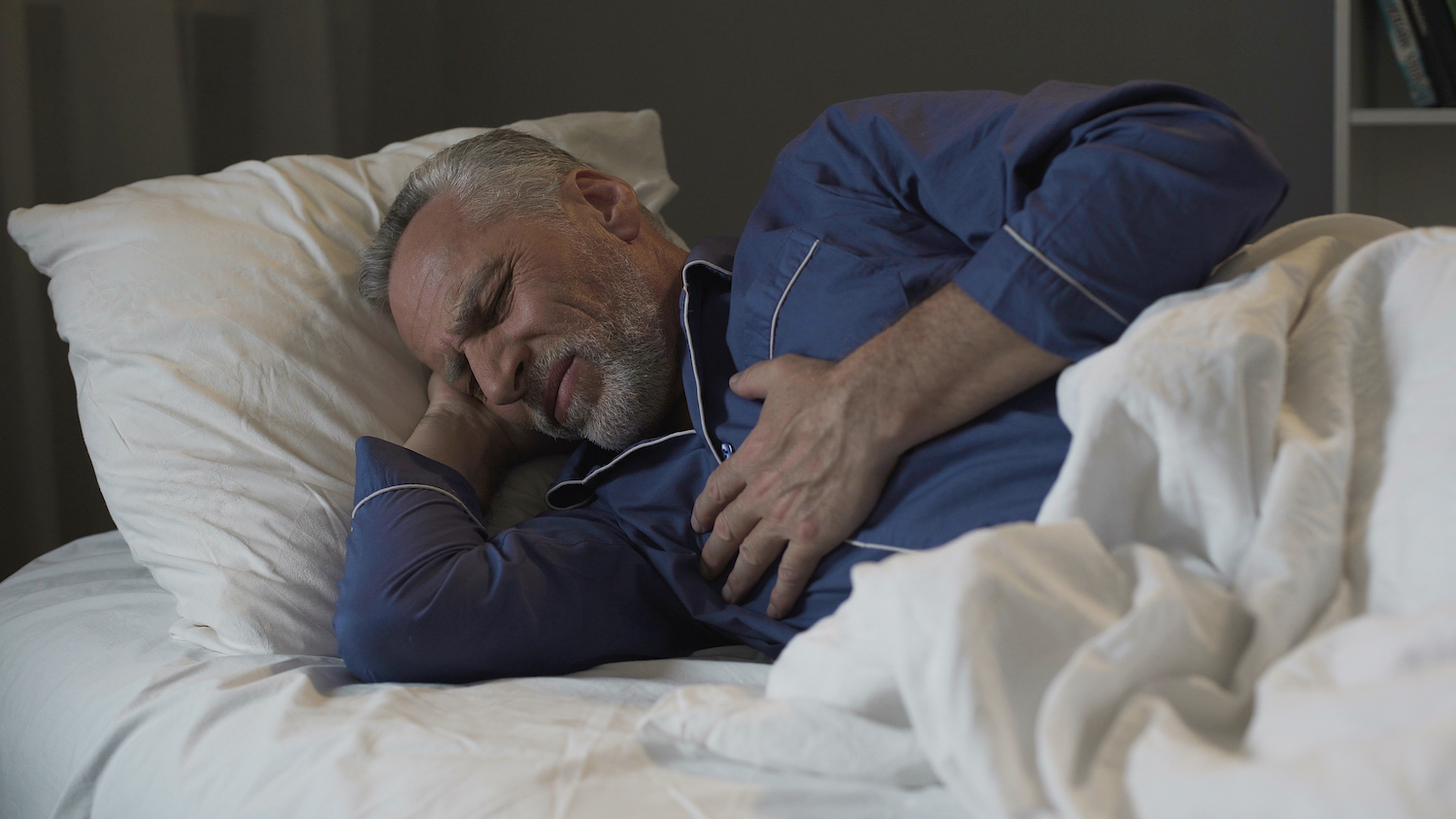Insomnia is an inability to get good sleep, even when you have enough time and opportunity for it. If you have insomnia, you may struggle with falling asleep, staying asleep, or both.
Occasional insomnia-like symptoms affect as many as two in three adults. More persistent insomnia impacts up to 15% of people.
Insomnia is even more common among people with sleep apnea. It is estimated that as many as 50% of people with obstructive sleep apnea (OSA) deal with insomnia symptoms.
Like sleep apnea, insomnia can have significant short- and long-term effects. It can drag down your energy levels, mood, and concentration during the day. Over time, it can also heighten your risk of other health problems, like high blood pressure.
On this page, we cover all the essential information about insomnia, including its symptoms, causes, diagnosis, treatment, as well as how it relates to sleep apnea.

What is Insomnia?
Insomnia is when you have a hard time sleeping. In practice, this means that you have one or more of the following problems:
- An inability to fall asleep when you want to
- A tendency to wake up during the night and have a hard time getting back to sleep
- Waking up earlier in the morning than you want to
In everyday conversations, people use the term “insomnia” to refer to general sleeping problems or a lack of sleep. But insomnia is a sleep disorder with specific characteristics related to sleep onset (falling asleep) and sleep maintenance (staying asleep).
If you have insomnia, poor sleep health negatively impacts you when you are awake. Examples of these impacts include fatigue, a shortened attention span, irritability, and daytime sleepiness.
Another defining characteristic of insomnia is that it disrupts your sleep even though you have the time and opportunity to sleep well. If you only budget time for three hours of sleep per night, you likely suffer from sleep deprivation, but that’s different from insomnia.
Short-Term vs. Chronic Insomnia
Often, insomnia is just a temporary problem that arises during a period of unusually high stress. This is known as acute or short-term insomnia. When things settle down, sleeping problems may resolve naturally and without any need for treatment.
In other cases, insomnia is a long-term problem. When symptoms arise on three or more nights per week for a period of at least three months, it is known as chronic insomnia.
Chronic insomnia usually has an underlying cause. For example, long-term insomnia may be linked to another health condition or a medication. Chronic insomnia, however, doesn’t always have a clear and direct explanation.
If short-term insomnia doesn’t go away, it can become chronic insomnia.
Insomnia Symptoms
The core symptom of insomnia is an inability to fall asleep or stay asleep. At times, you may find yourself in bed tossing and turning, and you may not even know for sure if you’ve been awake or asleep.
Disrupted sleep leads to daytime symptoms of insomnia, which can include:
- Mood changes like irritability or anxiousness
- Drowsiness
- Fatigue
- Impaired memory or concentration
- Being preoccupied with sleep
Having insomnia can sometimes cause anxiety about sleep, which makes it even harder to sleep well. In this way, insomnia’s symptoms can create a negative loop that makes the condition worse.
That said, having insomnia doesn’t necessarily mean that you sleep poorly every night. You may be able to sleep well on some nights despite generally struggling to sleep when you would like to.
When to Talk to Your Doctor
Seeing a doctor can usually help you get better sleep. You should talk to your doctor if:
- You have persistent or worsening sleep problems that are affecting your everyday life
- You have pain or other health issues that are impacting your sleep
- You have a mental health condition like depression or anxiety that seems to be altering your sleep
- You are being treated for insomnia but continue to have sleep problems
What Causes Insomnia?
Many different factors can cause insomnia, and sometimes you can’t precisely pinpoint the reason for it.
When a sleeping problem first occurs, it’s often because of stress, which can have many sources. Stress may come from challenging work, relationship, or family situations.
Physical stress can also contribute to insomnia. For example, pain can make it harder to sleep well. Using alcohol, caffeine, and certain drugs can disrupt sleep, and so can withdrawal when stopping using some drugs.
Difficulty sleeping may be related to poor sleep habits. Issues like having excess light or noise in your bedroom, napping too late in the day, and having an inconsistent sleep schedule can play a role in insomnia.
Chronic insomnia can be caused or worsened by other health conditions, including:
- Respiratory or cardiovascular problems
- Diabetes
- Mental health conditions, including anxiety and depression
- Neurological issues, such as Alzheimer’s dementia
While chronic insomnia can frequently be traced back to an underlying issue, sometimes there is no clear cause. Even sleep experts aren’t entirely sure why this happens, but it may be related to genetics or to ongoing issues that influence sleep, such as work schedules or emotional distress.
Are Some People More Likely to Have Insomnia?
Studies have found that insomnia occurs more often in certain groups of people, including older adults and females. It’s also more common in people who have had insomnia before or who have had a close family member with insomnia.
Everyone deals with stressors and health issues, but not everyone develops insomnia. Some factors that are believed to increase the risk of insomnia include:
- A natural tendency to be awakened more easily from sleep
- Mental health conditions like depression and anxiety
- Experiencing very strong reactions to stressful events
Insomnia is diagnosed based on the nature of your sleep habits and sleeping problems. Most of the time, tests are not needed to diagnose the condition.
A doctor starts the diagnostic process by asking questions about your sleep, and they may ask you to use a sleep journal to track key details about your sleep for a few weeks. The doctor will also usually do a physical exam and ask about other aspects of your health.
With this information, they can determine whether your symptoms meet the criteria for short-term or chronic insomnia.
The symptoms of insomnia can be similar to the symptoms of many other sleep disorders. For that reason, your doctor may recommend one or more of the following tests to check for other conditions.
- Overnight sleep study: During a sleep study, you spend the night in a sleep clinic with special equipment and sensors that closely monitor your breathing, muscle movement, heart rate, and brain activity while you sleep.
- Home sleep apnea test: This type of testing looks for signs of sleep apnea by tracking your blood oxygen levels, pulse, and breathing.
- Actigraphy: For this testing, you wear a device that is similar to many popular sleep trackers, and it collects data about your physical movements. This data helps the doctor understand your sleep patterns.

Insomnia Treatments
Treatment for insomnia is often tailored to the cause and severity of sleeping problems.
For short-term insomnia triggered by stress, sleep disruptions may stop on their own once the stress dies down. In these cases, insomnia may not require specific treatment.
If insomnia continues or is significantly disrupting your daily life, treatment may involve addressing underlying causes, improving thoughts and habits related to sleep through cognitive behavioral therapy for insomnia (CBT-I), taking medications, or a combination of those options.
Addressing Underlying Causes of Sleeping Problems
For some people, dealing with an underlying cause of sleep disruptions can effectively treat insomnia. For this to work, there needs to be a clearly identifiable and treatable cause, such as pain, a mental health condition, or a specific source of stress.
Improving Sleep Habits and Cognitive Behavioral Therapy for Insomnia
For chronic insomnia, the initial treatment typically focuses on improving sleep habits and trying to combat negative thoughts and feelings about sleep.
This type of treatment is commonly known as cognitive behavioral therapy for insomnia or CBT-I, and it works for most people with insomnia.
CBT-I is led by a trained counselor and involves specific action steps that are adapted to suit every individual and the main drivers behind their symptoms.
For instance, the counselor may suggest avoiding alcohol or caffeine if they contribute to sleeping problems. They may also provide strategies for relaxation and stress relief to avoid getting frustrated when lying awake in bed.
Prescription Medications for Insomnia
There are several types of medications that doctors can prescribe as treatments for insomnia. These medications are designed to make it easier to fall asleep or stay asleep through the night.
Almost all of these drugs can cause drowsiness that carries over to the morning. They can also induce sleepwalking and other abnormal behavior during sleep. These effects can increase the risk of falls, car crashes, and other accidents.
Because these medications can have side effects, doctors often recommend other approaches first, such as addressing underlying causes of insomnia or trying CBT-I. That said, some people may benefit from using medications in combination with those other treatments.
Sleep experts generally don't recommend using over-the-counter drugs to try to improve sleep. The body can build up a tolerance to those drugs, making them less effective over time. Over-the-counter medications also cause a range of side effects, including some potentially serious complications in older adults.
Living with Insomnia
Insomnia can be frustrating and fatiguing, but it usually gets better with treatment and better sleep hygiene.
If insomnia makes you sleepy during the day, be careful about when you drive. Drowsy driving from insomnia can increase the risk of a car accident. Similarly, you should be mindful of your energy levels at work, especially if you operate heavy machinery.
While insomnia interferes with your sleep and everyday activities, it may not affect you every single day. Even though symptoms can vary from day to day, sticking with treatment like CBT-I is important for positively impacting your sleep.
After insomnia has been treated, maintaining healthy sleep habits can help prevent a recurrence of sleeping problems. Having a consistent sleep schedule can keep your sleep health on track.
If you notice any disruptions in your sleep, you should always follow up with your doctor to determine the most appropriate next steps.

Insomnia Prevention and Sleep Hygiene
An important step in both preventing and treating insomnia is establishing good sleep hygiene. This means improving your daily habits and routines so that they are more conducive to quality sleep.
Examples of practical sleep hygiene tips include:
- Following a consistent schedule for when you go to bed and wake up
- Sticking with your established sleep schedule on both weekdays and weekends
- Reducing screen time as you get closer to bedtime
- Engaging in exercise or physical activity every day
- Avoiding caffeine after lunch and alcohol in the late evening
- Keeping your bedroom quiet, dark, and free of distractions
- Getting ready for bed with a calming nightly routine
- Learning relaxation techniques to help you minimize stress and ease into sleep
Insomnia and Sleep Apnea
Insomnia and sleep apnea are separate sleep disorders, but they often overlap.
People with obstructive sleep apnea (OSA) have repeated sleep interruptions caused by disrupted breathing. As many as half of people with OSA experience insomnia-like symptoms like restless sleep. Some of the other symptoms are also similar, including daytime drowsiness and fatigue.
Difficulty falling asleep can make it harder for people to stick with OSA treatment, including but not limited to continuous positive airway pressure (CPAP) machine therapy. Sometimes people who have long-lasting insomnia could also have an undiagnosed case of sleep apnea.
These are just a few ways that OSA and insomnia can exacerbate one another. Because they are separate disorders, they generally need separate treatments. However, addressing OSA may help resolve insomnia and vice versa.





